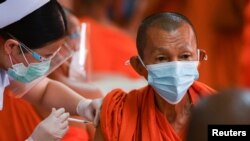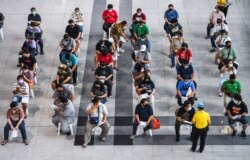On August 1, protesters across Thailand took part in so-called “car mob” demonstrations, calling on Prime Minster Prayut Chan-o-cha to resign over what they call his failed COVID-19 pandemic response.
Violence erupted in the capital, Bangkok, with police reportedly using water cannons, rubber bullets and tear gas to disperse demonstrators.
On August 2, a small group of protesters descended on Royal Thai Police Region 1, outside of Bangkok in Pathum Thani Province, calling for the release of those arrested the previous day. Police have threatened to prosecute demonstrators, calling the protests illegal under emergency powers introduced to curb the spread of COVID-19.
The government sought to ramp up those powers on July 29 by issuing an order under the emergency decree banning not just false news, but information that “could cause public panic” or “… lead to misunderstandings and affect national security” – language offering broad terrain on which to stifle government critics.
Media organizations and human rights lawyers have petitioned the courts to nullify that order on press freedom grounds.
Also on June 29, Prayut gave an interview at the Government House seeking to counter criticism of the pandemic response.
“If we contemplate the transmission in our country, it may seem shocking, given the daily fatalities. I want you to try paying attention to these numbers in our neighboring countries and others for a change,” he said.
“At present, every country in the world has more or less felt the impact. There are many top-ranking countries, as you can see, whose numbers are many times higher than ours.”
Prayut said he did not believe the country’s pandemic response “is problematic,” adding that “distorted information” could make “it seem like the system was not good.”
Yet, while countries in Southeast Asia and beyond have struggled with the pandemic, the Thai government’s missteps have exacerbated the situation.
Critics allege that the government squandered its early victories with an ineffective vaccine rollout. Thailand’s initial vaccine strategy was heavily reliant on Chinese-made vaccines and the AstraZeneca jab. The latter is locally manufactured by Siam Bioscience, owned by Thailand’s King Maha Vajiralongkorn. Siam Bioscience cut a deal with the U.K.-Swedish drug maker AstraZeneca to produce its COVID-19 vaccine in Thailand in October 2020.
In January, Thanathorn Juangroongruangkit, a politician with the banned Future Forward Party, criticized what he called the over-reliance on Siam Bioscience in the country’s vaccine procurement strategy, arguing the company had insufficient experience in making vaccines.
Thanathorn was charged with Les Majeste – insulting the monarchy – for those comments, punishable by up to 15 years in prison.
According to The Associated Press, the government announced that 6 million doses of the AstraZeneca vaccine would be produced locally in June, with production ramping up to 10 million doses monthly from July to November, followed by 6 million doses in December, hitting 61 million total doses.
When the mass vaccination campaign began on June 7, Prayut proclaimed “[t]he vaccines will be delivered as planned.”
However, in July, government officials said production targets would not be reached. A letter leaked from AstraZeneca dated June 25 appeared to contradict government claims that the drugmaker had promised 10 million doses per month.
The letter stated that with “uninterrupted manufacturing,” Thailand’s Ministry of Public Health would receive 5 million to 6 million doses a month, which the company said “is nearly twice the volume we discussed during our meeting on 7 September 2020, when your team estimated that Thailand's healthcare system required approximately three million doses per month.”
The Thai government had only reserved roughly a third of those doses for itself. The rest are for neighboring countries. That prompted the Thai government to consider an export cap.
In January, the Thai government said it had enough vaccine does to vaccinate 50% of the population of 70 million.
The CCSA estimates that, as of August 2, only 6% of the Thai population of nearly 70 million had been fully vaccinated, while some 13,955,087 people had received at least one dose.
Regarding the export cap, a confidential letter from AstraZeneca to Thailand’s health minister revealed that Thailand had an obligation to export 16.5 million doses to the Philippines, 30 million to Vietnam and 50 million to Indonesia, the Voice of America reported on July 27, citing local Thai media.
In that letter, AstraZeneca also suggested that Thailand join the COVID-19 Vaccine Global Access (COVAX) alliance, a global initiative aimed at creating equitable access to COVID-19 vaccines directed by the World Health Organization and others.
Thailand was the only Southeast Asian nation to reject joining the alliance.
In February, a Thai government spokesperson told the Reuters news agency that the country was not eligible for free or cheap vaccines under COVAX due to its middle-income country status. But faced with massive vaccine shortfalls, the government made an about face, announcing on July 21 that it had joined COVAX.
The Associated Press quoted National Vaccine Institute Director Nakorn Premsr as apologizing for failing to “procure a sufficient amount of vaccines appropriate for the situation.” More senior government officials have not admitted culpability.
Vaccines will not be available via COVAX until the first quarter of next year, further delaying efforts to procure sufficient vaccine supply as Daily COVID-19 cases and fatalities in the country hit a record high on August 3.
Meanwhile, healthcare experts, including those with the Infectious Disease Association of Thailand, have called on the Thai government to stop purchasing China’s Sinovac vaccine, arguing it does not provide sufficient protection against the delta variant of COVID.
Thailand's health ministry announced in July that people who got a first shot of Sinovac would get the AstraZeneca vaccine for their second dose. Healthcare workers, hundreds of whom contracted COVID-19 after receiving two shots of Sinovac, will get a third dose of AstraZeneca.
Others have defended Sinovac against what they call “biased criticism” of the Chinese vaccine, saying the efficacy criticism is overblown. Dr. Prakit Vathesatogkit, an expert on lung diseases at Ramathibodi Hospital, Mahidol University, said that of the 700,000 Thai healthcare workers fully vaccinated with Sinovac, only 1 had died and 700 been infected with COVID-19 as of July 18.
As of July 21, Chinese-manufactured vaccines accounted for roughly half of the 15 million vaccine doses administered in Thailand (7.8 million doses of Sinovac and 558,179 doses of Sinopharm).
Thailand’s vaccine woes came as it was hit with a third wave of COVID-19 in April. Then, in July, a top adviser with Thailand’s Center for COVID-19 Situation Administration (CCSA), established to coordinate the government’s response, announced there was a fourth wave, from the delta variant.
Thailand has since seen a surge in COVID-19 infections, with the government recording 652,185 total infections as of August 3 and 5,315 deaths. Public health officials have conceded that hospitals in Bangkok have run out of beds for moderate and severe COVID-19 cases, with the deputy public health minister saying that some people may have died at home waiting for a hospital bed.
Other medical resources are severely strained.
With low vaccination rates and inadequate vaccine supplies, semi-lock down measures are being used to help limit new infections in the worst-affected provinces.
Those measures have fueled a growing economic crisis, with experts warning Thailand is poised for the first double-dip recession since the 1998 financial crisis.







